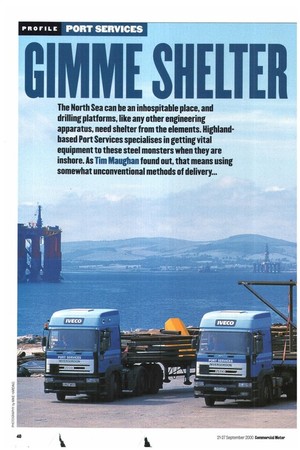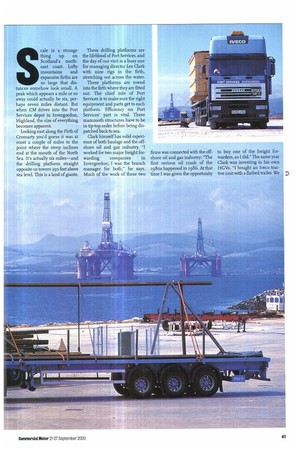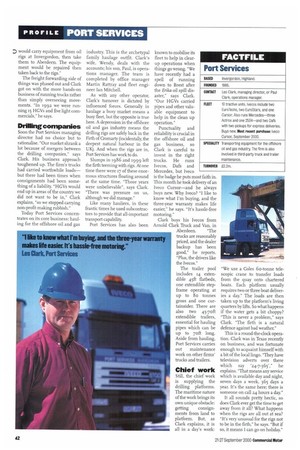ESHELTER
Page 42

Page 43

Page 44

If you've noticed an error in this article please click here to report it so we can fix it.
The North Sea can be an inhospitable place, and drilling platforms, like any other engineering apparatus, need shelter from the elements. Highlandbased Port Services specialises in getting vital equipment to these steel monsters when they are inshore. As Tim Maughan found out, that means using somewhat unconventional methods of delivery...
Scale is a strange thing up on Scotland's northeast coast. Lofty mountains and expansive firths are so large that distances somehow look small. A peak which appears a mile or so away could actually be six, perhaps seven miles distant. But when CM drives into the Port Services depot in Invergordon, Highland, the size of everything becomes apparent.
Looking east along the Firth of Cromarty you'd guess it was at most a couple of miles to the point where the steep inclines end at the mouth of the North Sea. It's actually six miles—and the drilling platform straight opposite us towers 250 feet above sea level. This is a land of giants.
These drilling platforms are the lifeblood of Port Services, and the day of our visit is a busy one for managing director Les Clark with nine rigs in the firth, stretching out across the water.
These platforms are towed into the firth where they are fitted out. The chief role of Port Services is to make sure the right equipment and parts get to each platform. Efficiency on Port Services' part is vital. These mammoth structures have to be in tip-top order before being dispatched back to sea.
Clark himself has solid experience of both haulage and the offshore oil and gas industry. "I worked for two major freight for warding companies in Invergordon; I was the branch manager for both," he says. Much of the work of these two firms was connected with the off. shore oil and gas industry: "The first serious oil crash of the 1980s happened in 1986. At that time I was given the opportunity to buy one of the freight forwarders, so I did." The same year Clark was investing in his own HGVs. "I bought an Iveco tractive unit with a flatbed trailer. We
0 would carry equipment from oil rigs at Invergordon, then take them to Aberdeen. The equipment would be repaired then taken back to the rigs."
The freight forwarding side of things was phased out and Clark got on with the more hands-on business of running trucks rather than simply overseeing movements. "In 1992 we were running 15 HGVs and five light commercials," he says.
Drilling companies
Soon the Port Services managing director had no choice but to rationalise. "Our market shrank a lot because of mergers between the drilling companies," says Clark. His business approach toughened up. The firm's trucks had carried worthwhile loads— but there had been times when consignments had been something of a liability. "HGVs would end up in areas of the country we did not want to be in," Clark explains, "so we stopped carrying non-profit making rubbish."
Today Port Services concentrates on its core business: hauling for the offshore oil and gas industry. This is the archetypal family haulage outfit. Clark's wife, Wendy, deals with the accounts; his son, Paul, is operations manager. The team is completed by office manager Martin Rattray and fleet engineer Ian Mitchell.
As with any other operator, Clark's turnover is dictated by influenced forces. Generally in haulage a busy market means a busy fleet, but the opposite is true here. A depression in the offshore oil and gas industry means the drilling rigs are safely back in the Firth of Cromarty (incidentally, the deepest natural harbour in the UK). And when the rigs are in, Port Services has work to do.
Slumps in 1986 and 1999 left the firth teeming with rigs. At one time there were 17 of these enormous structures floating around at the same time. "Those years were unbelievable", says Clark. "There was pressure on us, although we did manage."
Like many hauliers, in these frantic times he used subcontractors to provide that all-important transport capability.
Port Services has also been
known to mobilise its fleet to help in clearup operations when things go wrong. "We have recently had a spell of running down to Brest after the Erika oil spill disaster," says Clark. "Our HGVs carried pipes and other valuable equipment to help in the dean up operation."
Punctuality and reliability is crucial in the offshore oil and gas business, so Clark is careful to invest in the right trucks. He runs Ivecos, Dafs and Mercedes, but Iveco is the badge he puts most faith in. This month he took delivery of an Iveco Cursor—and he always buys new. Why Iveco? "I like to know what I'm buying, and the three-year warranty makes life easier," he says. "It's hassle-free motoring."
Clark buys his Ivecos from Arnold Clark Truck and Van, in Aberdeen. "The trucks are reasonably priced, and the dealer backup has been good," he reports.
"Plus, the drivers like the Ivecos."
The trailer pool includes 14 extendible 45ft flatbeds, one extendible step. frame operating at up to 8o tonnes gross and one curtainsider. There are also two 45-7oft extendible trailers, essential for hauling pipes which can be up to 7oft long. Aside from hauling, Port Services carries out maintenance work on other firms' trucks and trailers.
Chief work
Still, the chief work is supplying the drilling platforms. The maritime nature of the work brings its own unique obstacle:
getting consignments from land to platform. But, as Clark explains, it is all in a day's work:
"We use a Coles 6o-tonne telescopic crane to transfer loads from the quay onto chartered boats. Each platform usually requires two or three boat deliveries a day." The loads are then taken up to the platform's living quarters by lifts. So what happens if the water gets a bit choppy? "This is never a problem," says Clark. "The firth is a natural defence against bad weather."
This is a round-the-dock operation. Clark was in Texas recently on business, and was fortunate enough to acquaint himself with a bit of the local lingo. "They have television adverts over there which say '24-7-365'," he explains. "That means any service which is available day and night, seven days a week, 365 days a year. It's the same here; there is someone on call 24 hours a day."
It all sounds pretty hectic, so does Clark ever get the time to get away from it all? What happens when the rigs are all out at sea? "It's very unusual for the rigs not to be in the firth," he says. "But if so, it means I can go on holiday."












































































































